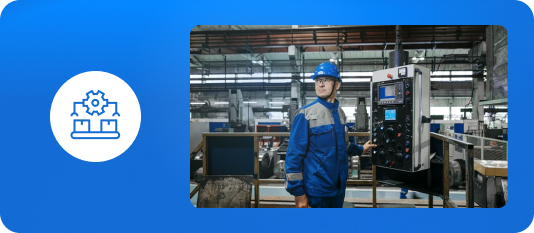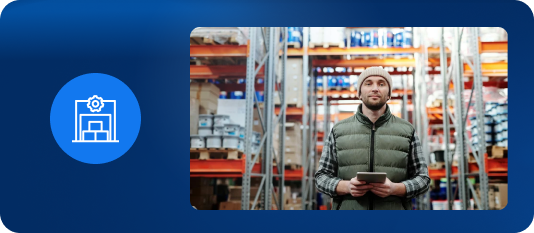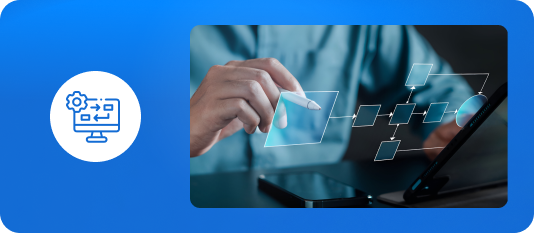Systems for production
Explore the possibilities of manufacturing process automation
React efficiently to changes in market demand and quickly respond to customer orders. Effectively manage your production process and make accurate operational decisions based on current and reliable data. Utilize the potential of your resources and maintain their efficiency at the highest level. Prevent losses, reduce costs, and simultaneously increase profits by using IT support for production management. Take advantage of modern IT solutions for industrial automation.
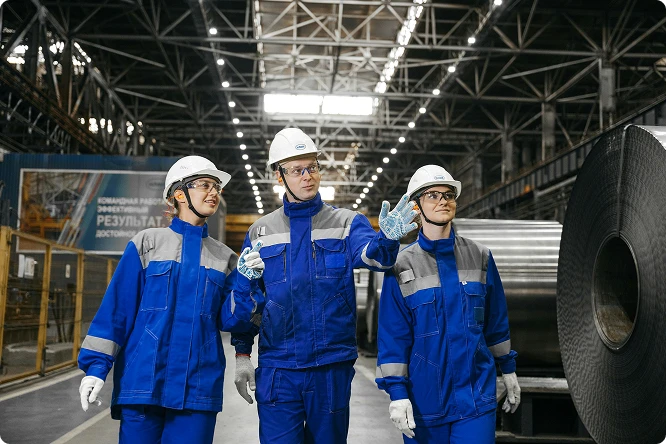
Take advantage of modern IT solutions tailored to Industry 4.0
TimeLine ERP
A system that streamlines the planning, organization, and execution of production orders and unit costs.
MoreMES Application
An application that helps with task assignment and settlement, as well as the utilization of production resource potential.
MoreComarch ERP XL Production
A system with domain-specific functionalities that support the coordination of production processes.
More
Gain complete control over your production to increase efficiency
Maintain the continuity of your manufacturing processes by operating in a secure, stable, and efficient IT environment. Manage your technological operations and complete tasks using the latest, constantly updated hardware and system solutions that enable effective automation of industrial production. Leverage new, intelligent technologies to respond faster to market needs while maintaining the highest possible quality of delivered products.
See how much you can gain with an ERP system for manufacturing
We focus on every aspect of the production management process
We provide industrial companies with professional IT support for the automation of production processes. We provide consulting services in process optimization, as well as implementation and integration services related to the digitization of production. We assist in the selection and development of software – adapting it to the company's unique processes, as well as processes resulting from dynamically changing environmental conditions.
 Stage 1
Stage 1
 Stage 2
Stage 2
 Stage 3
Stage 3
 Stage 4
Stage 4
 Stage 5
Stage 5
 Stage 6
Stage 6
Manage production effectively from planning to cost accounting
We help companies achieve a more effective digital transformation of their production processes, increasing their technological sophistication. We provide specialized IT systems for processes related to order planning, production monitoring, resource management, quality control, analysis, and cost accounting. We utilize the latest solutions to ensure seamless collaboration and communication between employees, machines, and systems within a single, coherent, and reliable IT environment.
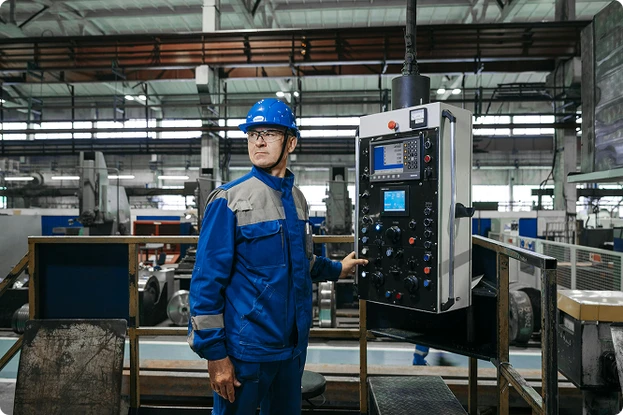
Production planning
Planning with forecasting based on resource availability and deadlines.
Production monitoring
Information on order progress, product quantities, and machine status.
Material requirements
Raw material planning according to needs and order deadlines.
Quality control
Complete statistics on irregularities in the production process.
Just-in-time analytics
Data provided in real time to facilitate decision-making and operational efficiency.
Cost settlement
Preliminary calculation and settlement of unit costs.
We computerize companies across a wide range of industries
We take a comprehensive approach to computerization and production automation. We can help you build the environment from the ground up to enable more efficient and effective processes.
Automotive
Traceability and monitoring of parts from purchase to sale, including complaints.
Foundry
Scheduling furnace operations to prevent unnecessary shutdowns.
Industrial
Transferring order-related information and obtaining machine data from order fulfillment.
Engineering
A design-based approach to production with calculation and pricing options thanks to CAD integration.
Materials
Monitoring chemical data and the composition of materials used in production.
Electroplating
Material receipt and planning during coating of the assigned part.
Articles
See the latest articles, expert advice, interviews, and reports related to the digitalization of processes and the latest technologies.
In a production environment, proper integration of systems and applications (...)
Production losses stem from, among other things, maintenance incidents, (...)

Frequently asked questions about ERP systems for manufacturing
A production management system is domain-specific software with functionalities supporting production planning and monitoring, as well as the settlement of related costs, including unit costs. It incorporates features of APS, MES, and MRP systems, facilitating scheduling, order recording, progress monitoring, task and process status verification, and analysis of machine performance and process efficiency. The production system integrates various production-related areas—from warehouse and procurement, to quality and sales—allowing for complete control over the manufacturing process.
An ERP system is software whose modules correspond to specific areas of the enterprise, supporting the processes within it with their functionalities. Therefore, it is a solution applicable to both manufacturing companies and those operating in other industries. A manufacturing ERP system, on the other hand, is domain-specific software whose functionalities cover only the production area and comprehensively support all activities within it, from planning, through execution, to production settlement. Its modules are typically equipped with highly specialized mechanisms, such as those ensuring interoperability with CAD software or monitoring the status of machines and equipment.
A production management system should provide functionalities supporting production planning, order planning, and technological operations (APS), order execution and machine performance monitoring (MES), material requirements planning (MRP), quality control (QC), performance analysis (BI), and cost accounting. It should be compatible with ERP, WSM, accounting, HR, or any other system used within the company that is essential for obtaining information for production planning and management. Traceability and Internet of Things capabilities are also essential.
Production management systems offer a wide range of functionalities and are scalable. This means they can be tailored to the needs of both large enterprises and smaller-scale manufacturing operations. They enable basic production planning and recording, raw material consumption monitoring, and tracking the status of technological operations. This allows both large and small plants to operate more efficiently, tailored to their specific needs.
Although production management systems are multi-module solutions, it's not necessary to implement all their functionalities, only those needed by the company. Therefore, if a planning tool is missing from the production optimization perspective, you can implement the APS module, and MES supports order management. It's always possible to implement additional modules if the company perceives such a need in the future.
The implementation of a production management system is preceded by an analysis of the company's structure, processes, and needs, which serves as an important starting point for determining the required functional scope of the implemented solution. The system is then configured according to the company's specific needs and production processes, and integrated with other software, such as an ERP system. System testing is a crucial part of the implementation process, ensuring correct implementation and configuration. Only then can data be migrated and the system launched in production mode. Employee training in the new solution is also crucial. The implementation time depends on the complexity of the plant, the number of functionalities being implemented, and the integrations being performed, so it is a case-by-case matter.
Modern production systems increasingly enable connection to machines via sensors or controllers. This enables real-time data acquisition, such as task status, operation progress, material consumption, downtime due to failures, or changes in planning. Such integration allows for comprehensive production monitoring and overall efficiency (OEE) assessment, rapid response to failures, and improved maintenance planning.
Want to know more? Contact us
Let us know your needs and expectations, and our consultant will contact you. Together, we'll choose the best solutions for your business.




